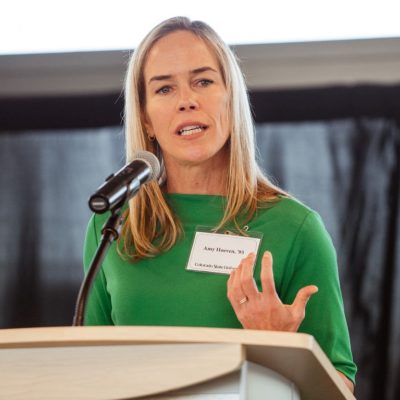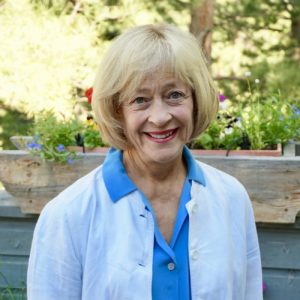
Passionate advocates for CSU and for student access
what do elephants and universities have in common? The young are taken care of by the entire herd.
And that’s the philosophy behind Amy and Kurt Hoeven’s Elephant Scholarship: take care of one another.
Amy (’95) grew up in Sterling, Colo., a town of 14,000 in northeastern Colorado. Known as the “Queen City of the Plains,” Sterling, and its close-by neighbors of Fort Morgan and Yuma are proud rural communities who are actively working to provide their young people (and their towns’ changing demographics) with opportunities, many of which are possible at CSU.

Through Amy’s work with Professor Eric Ishiwata to provide peer mentorship to first-generation students in Fort Morgan, her own experience growing up in a small town, and her participation in the Liberal Arts Development Council, Amy and her husband decided to financially support students by creating a scholarship specifically for students from communities in rural northeastern Colorado.
“[The scholarship] came about during a crucial time with my relationship with CLA,” says Amy. “We view this scholarship as a tool to help rural communities. We’re not doing enough to acknowledge their value and importance. I hope to help bridge the rural-higher ed divide.”
She created the scholarship in 2019, which was first awarded in the 20-21 academic year. So far, four students have received the scholarship, which varies in amount from $500 to 2,000 dollars.
Arelys Gamboa, scholarship recipient, shares her experience:
“Being a first-generation student from a cultural community that experiences many financial barriers, access to higher education is always met with extreme sacrifice. The Elephant Scholarship provides me with a means to alleviate some of these barriers, making my education accessible, and allowing me to achieve my goals.”
So how did a scholarship for rural students become named Elephant Scholarship?
“Elephants are near and dear to me,” says Amy. “They adopt one other’s young.
“We are here to take care of you at CSU. That’s what elephants do, and that’s what I hope this scholarship does.”
Read more about Amy Hoeven’s contributions to CSU:
Carving Paths for Others
Karen (Layton) Barker (’71) has always liked setting out on the trail: whether hiking in the Rocky Mountains, biking in Europe, or skiing anywhere the snow has just fallen. Her curiosity about people and the world has led her to new destinations across many continents, encountering new people and new opportunities to put her enthusiasm and support behind issues she values.
An active contributor to multiple nonprofit organizations, and a world traveler with a passion for helping others, Karen and her husband, Scot, created the Karen and Scot Barker Diversity Scholarship fund in 2015, which is renewable for five years and provides up to 75% of resident tuition and fees for recipients. Recipients must demonstrate a history of community engagement, volunteerism, or family service working with traditionally underrepresented or underserved populations as well as a desire to be a mentor to or work with those populations in the future.

“Because I’ve traveled so much, what stands out to me is the oppression of millions of women who, if given an education, could help change the trajectory of poverty and become contributors to improving the local and national economy of their country. The ripple effect starts with one girl who then positively impacts her family, community, and eventually the government.
Beyond financial support, Karen Barker also provides the student scholarship recipients with additional mentorship, connections, and support. “I see myself as a conduit or liaison between the university and the world outside of it,” she says. For example, Barker has assisted scholarship recipient Daniela with letters of application to law school and, after she graduated law school, with connections to law firms who are looking for someone with her qualifications.
“Because I’ve come from humble beginnings, I’ve worked hard to achieve my goals. But I also realize I’ve had a much easier time than the young women I’m mentoring,” says Barker. “I want to participate in whatever way I can in leveling the playing field for others.”
Read more about Karen Barker:
